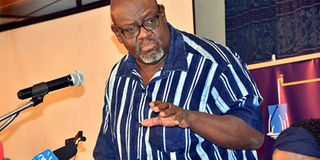Why the ‘Nation’ refers to John Githongo as an anti-graft czar

Inuka Kenya Chief Executive Officer John Githongo addresses guests during the launch of a report titled State Capture: Inside Kenya's inability to fight corruption at Laico Regency Hotel on May 22, 2019. Mr Githongo was one of the first anti-corruption czars. PHOTO | FILE | NATION MEDIA GROUP
What you need to know:
- The NMG has not reserved the title of “czar” for Mr Githongo; it has used it to refer to other Kenyans appointed to fight corruption.
- Despite the dismal failure of Mr Githongo, a czar who can cut through bureaucracy and power plays to fix problems can be very useful.
Wandia Seaforth asks why NMG reserves the use of the title “anti-corruption czar” for John Githongo.
“I don’t recall seeing it used to describe anyone else,” she says. “Is this a positive, negative or neutral description of Githongo? Have no other czars emerged since?”
Mr Githongo was one of the first anti-corruption czars, and probably the most famous, in the wake of the global movement against corruption that began in the 1990s and culminated in the United Nations Convention against Corruption.
Kenya was the first country to sign and ratify the convention — all on the same day — on December 9, 2003.
Then 37, Mr Githongo was appointed, in January 2003, the permanent secretary in the Office of the President in charge of governance and ethics.
The title was too long. It did not lend itself well to crisp and brisk journalistic reporting. So, the media created the shorter and exciting informal title of “anti-corruption czar”.
QUALIFICATIONS
The title fit Mr Githongo perfectly. An economics and philosophy degree holder and son of an accountant father, he had experience as a bribery and fraud investigative journalist and was also a member of Transparency International.
Mr Githongo was also a towering figure. In her book It’s Our Turn to Eat: The Story of a Kenyan Whistle-Blower, published in June 2009, Michela Wrong describes him as a giant.
“Standing well over six feet, he had girth as well as height; the fifty-eight-inch chest and massive shoulders of the gym habitué,” she writes.
“Czar” is a Russian word meaning king or emperor. Czars ruled Russia until the Bolshevik Revolution of 1917.
Although they were often autocratic and dictatorial, it was during their rule that Russia modernised and became a European superpower.
The NMG has not reserved the title of “czar” for Mr Githongo; it has used it to refer to other Kenyans appointed to fight corruption.
OTHER CZARS
For example, in a January 20, 2019 article, the Sunday Nation describes Twalib Abdallah Mbarak, sworn in on January 14, 2019 as the new chief executive officer of Ethics and Anti-Corruption Commission, as “the new anti-corruption czar”.
The NMG has also used the title in reference to Raila Odinga, who was in October 2018 appointed to help Africa to build its infrastructure.
In an article published on October 24, 2018, the Daily Nation referred to him as “the AU’s infrastructure czar”.
The word “czar” can be used as an informal title to describe any high-level official appointed for his skills or reputation to run governmental departments or deal with certain issues or challenges as an adviser, director, administrator or diplomatic envoy.
We can call such a person, for example, a “national security czar”, “education czar”, “anti-terrorism czar”, “Big Four czar”, “Building Bridges czar” and so on.
PERCEPTION
Whether “czar” is a positive, negative or neutral description of Mr Githongo depends on what you think of his performance.
But what we know for sure is that former Cabinet minister Chris Murungaru, who successfully sued Mr Githongo for defamation, and Ms Wrong, who depicts Mr Githongo as an anti-corruption crusader, would hold diametrically opposed views.
However, “anti-corruption czar” as an informal title accurately describes the kind of work Mr Githongo was supposed to do as adviser to President Mwai Kibaki on corruption and other governance-related issues.
By the time he packed his bags and fled to Britain in January 2005, claiming his life was in danger, the title was widely used around the world to describe officials appointed to fight corruption.
Despite the dismal failure of Mr Githongo, a czar who can cut through bureaucracy and power plays to fix problems can be very useful.
Send your complaints to [email protected]. Call or text 0721989264




